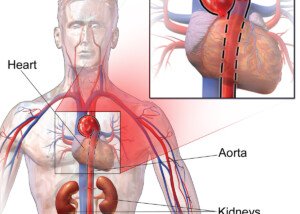
A vascular surgeon comments on aortic aneurysm, and losing one’s temper and blood pressure rise.
According to one investigation, there is a strong link between aortic dissection (from pre-existing aneurysm) and extreme emotional stress—which would include a temper outburst.
A temper outburst would cause blood pressure rise. Blood pressure control is extremely important for people with an aortic aneurysm.
Patients are told to avoid heavy physical exertion such as heavy weightlifting or trying to install an air conditioner, as these can shoot up blood pressure, which can then cause conditions ripe for an aortic dissection.
Emotional stress, too, can raise blood pressure. Dr. John Elefteriades, an aortic repair surgeon, designed a survey of dissection patients.
Ninety responded regarding what they were doing right before the dissection occurred.
Thirty-six (40 percent) reported events that he categorized as severe emotional stress. Though this apparently is the only study of this kind, the results can’t be ignored.
Is it coincidence that 40 percent (although 90 is a very small number for a study) reported emotional stress (which of course is associated with high blood pressure)?
Must people with aortic aneurysms go through life tip-toeing on egg shells, suppressing their emotions, battling urges to vent their feelings about things in life?
“Losing one’s temper would increase the blood pressure and may result in aortic dissection in an individual with predisposing condition (medial cystic necrosis), but the effect on wall tension in an aortic abdominal aneurysm would most likely be negligible,” explains Seyed-Mojtaba Gashti, MD, a board certified vascular surgeon with Broward Health Medical Center in Florida.
So what does all this mean, then, as far as unleashing emotions?
“Not to say that you should go ahead and get angry all the time, but it is okay to get excited about your football team every now and then,” says Dr. Gashti.
Stress is a risk factor for high blood pressure (also known as hypertension), and that acute (sudden) stress can cause a dramatic rise, though it’s a temporary rise.
However, the transient nature of it can still have a devastating effect on a severely weakened aortic wall.
In fact, chronic hypertension can actually cause the aneurysm in the first place.
Hypertension even for people with healthy aortas can become a very serious, even life threatening condition.
It’s a powerful risk factor for stroke and heart disease, plus dementia and other major conditions.
What is medial cystic necrosis? This refers to a variety of metabolic conditions that affect the composition and structure of the middle layer of an aortic wall, says Dr. Gashti, by altering collagen, elastin, etc. This is seen in connective tissue disorders like Marfan’s syndrome, he points out.
He adds: “The most common consequence of this is aortic dissection; more than 90% of deaths in this group is related to aortic dissection, rupture, and sudden death.
“Aneurysms can also form in patients with this condition, but the incidence of that is low.”










































